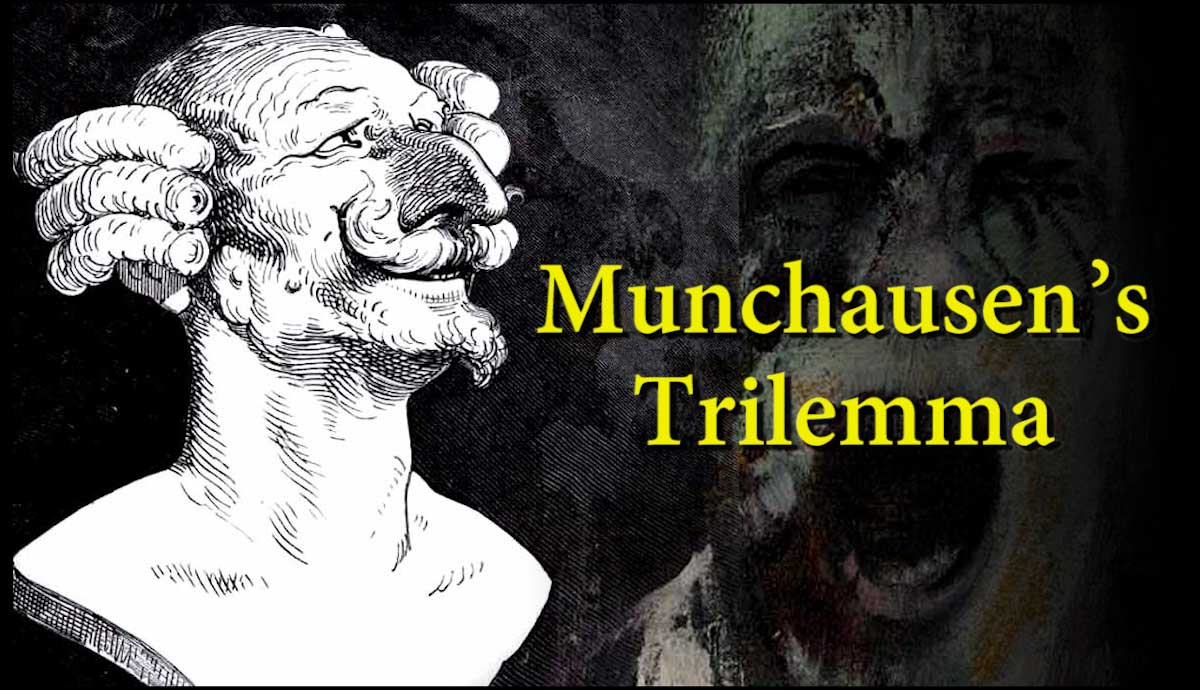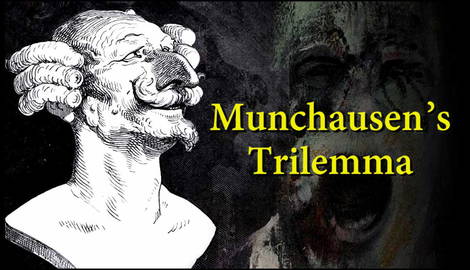
Munchausen’s Trilemma (or Münchhausen trilemma) is a concept that defies our ideas of truth and knowledge. Inspired by fictional storyteller Baron Munchausen, it gives three choices when you’re looking for the ultimate proof: keep going back forever (infinite regress), say “it’s true because I say so” (dogmatic assertion), or use your beliefs to prove themselves (circular reasoning). This article explores Munchausen’s Trilemma in more depth, considers what it means for epistemology, and asks whether there are limits to what humans can know. So, what’s the deal with this idea?
Origins of Munchausen’s Trilemma

The philosopher Hans Albert coined “Munchausen’s Trilemma” in the 20th century. He named it after the fictional character Baron Munchausen, who first appeared in Rudolf Erich Raspe’s writings in 1785. These stories center on a man known for telling outrageous tales about his experiences and abilities.
Many iterations of Baron Munchausen followed. He became an enduring figure because he tended to stretch the truth. Eventually, people began using “Baron Munchausen” as shorthand for any lie or exaggeration.
Hans Albert wrote the book Treatise on Critical Reason back in 1968. In this work, he tackled the difficulty of providing sufficiently solid reasons for everything we believe.
Albert used the phrase Munchausen’s Trilemma metaphorically to describe one particular issue people face as they try to understand knowledge and justifications. Earlier philosophers, including David Hume and Ludwig Wittgenstein, had also considered similar topics, such as uncertainty and where to begin thinking about something.
The Trilemma challenges the very foundations of knowledge: How can we know what we think we know? It offers three routes to ultimate justification, each with its own issues: infinite regress, circular reasoning, or dogmatic assertion.
Also, Albert chose to call the issue “Munchausen’s trilemma” because he wished to compare unsuccessfully trying to justify beliefs with the kind of extravagant lies that Munchausen loved so much. Just as you couldn’t accept everything Munchausen said at face value, maybe searching for solid foundations for our beliefs is a hopeless task, too.
Formulation of Munchausen’s Trilemma

Within epistemology, Munchausen’s Trilemma is a debate examining why we find it hard to prove something or show why it is true. It says that all ways of showing or proving something are fundamentally flawed. So, in other words, there is no perfect way of proving anything.
The trilemma identifies three particular problems with how we justify things. First is circular reasoning, which is an argument that relies on its own conclusion for support without saying enough about external evidence or reasons. This means you end up going around in circles because your argument constantly refers back to itself rather than something objective.
Another problem with justifying things is infinite regress. That’s when we try to prove a belief or argument by offering more proof, but then that new proof needs even more proof, and so on forever. It shows that there must be limits to how much justification we can provide for our claims of knowledge.
The third imperfection identified by Munchausen is the dependence on axiomatic propositions as a foundation for justification: these are self-evident truths or premises upon which arguments rest.
However, Munchausen’s Trilemma suggests that accepting these axioms without question can result in dogmatic assertions lacking proper verification or objective support. Taken together, Munchausen’s Trilemma challenges common assumptions about gaining knowledge and shows what happens when we try to prove or justify things.
Circular Reasoning

Circular reasoning is a type of logic error that happens when the evidence used to support an argument just restates or rewords what you’re trying to prove. It’s like saying something’s true because it’s true.
It creates a closed circle in which your starting point assumes what you have already tried to prove, so there is no way out.
This means circular reasoning can’t provide strong evidence for an argument because it never moves forward or offers any outside proof. Here’s an example that might help make this clearer:
1. God exists because it says so in the holy scriptures.
2. How do we know that the holy scriptures are true?
3. Well, they must be true because God divinely inspired them.
In this case, there is a circular argument where the premise and conclusion both depend on each other without any external proof or logical basis. The only way to say God exists is by assuming that holy scriptures are true – but those themselves assume God exists.
Non-theological contexts also contain examples of circular reasoning. For example:
1. This book is authoritative because an expert wrote it.
2. How do we know that this person is an expert?
3. Their authority comes from being recognized by those who have read their book.
Once more, we witness a cycle in which knowledge is assigned based on one’s status as an author, and one’s knowledge validates that status.
Infinite Regress

Infinite regress is an idea that Munchausen’s Trilemma shows us we need to watch out for. It’s what happens when we try to find more reasons or answers to back up a belief or argument and end up with an infinite set of explanations without ever getting to something solid or final.
In other words, there isn’t one place where you can stop looking for why things are certain ways – instead, it feels like endless questioning.
Consider how children might ask their parents many questions about why things happen or how they work. Parents can often give them answers, but sometimes, after repeatedly asking “why?” the child will eventually hear: “Just because!”
The parent is stuck. In some cases, there isn’t really anything else they can say. They have reached an endpoint beyond which no further explanation is possible. This is called infinite regress – it shows that sometimes, looking for good reasons just goes on forever.
Infinite regression makes us think about whether there can ever be foundations for knowledge claims that are so solid they don’t need any further support. Maybe there isn’t. Instead, it draws attention to the drawbacks associated with continuously seeking rationales or explanations without end.
Axiomatic Arguments

Axiomatic arguments rely on what we already know, believe, or accept about the world. They don’t need any further proof or justification because they’re assumed to be true based on what we’ve understood before.
For example, take the statement “Water freezes at 0 degrees Celsius.” This is an axiomatic claim because most people know and accept it as true. It’s a basic fact you learn through school and life experience.
You wouldn’t expect someone making this statement to provide extra evidence for why water turns solid below 32°F (the freezing point of H2O in Fahrenheit). They’re not saying anything new—just repeating established knowledge.
In the same vein, we can take the claim “Birds have feathers” as an example of an axiomatic argument—depending on globally recognized facts about birds and how they’re made.
However, a problem like Munchausen’s Trilemma might make us doubt whether axiomatic arguments are actually any good at finding out what’s true. This trilemma suggests that if we rely only on things we already know, our statements become assumptions. They have no real proof or way to check if they’re right.
For example, the assertion that chocolate ice cream is the best flavor could be true for one person based on their specific taste preferences. However, it can’t be universally accepted without considering differing palates and opinions.
So, regarding things like “chocolate ice cream is everyone’s favorite,” which might seem obvious because you already think that way (and so do people you know), Munchausen Trilemma reminds us that this isn’t enough proof. Not everybody agrees with us—sometimes even experts don’t!
Impact of Munchausen’s Trilemma on Epistemology

Munchausen’s Trilemma has greatly influenced the field of epistemology. This philosophical problem challenges the way we think about how well-founded our beliefs are and questions what we can actually know.
One thing it does is show that it’s hard to find a really good reason for saying anything at all. Our reasons either go around in circles, last forever or end up being something someone told us and we felt like believing. This is bad news for anyone who thinks they have discovered foundations for knowledge that nobody could possibly disagree with!
In addition, Munchausen’s Trilemma questions the idea that we can be completely sure about our beliefs. It shows how there are always problems with proving knowledge is true. This way of thinking agrees with fallibilism because it says even if our beliefs seem right—and are definitely well supported—they could still turn out to be wrong!
Moreover, this trilemma forces us to reconsider ideas or arguments very carefully. It makes sure we don’t just make things up or repeat what sounds right but always ask for proof and explain our reasoning.
Also, Munchausen’s Trilemma has led people to argue about other ways of dealing with this problem—like looking for where different ideas “fit together” (coherentism), taking into account the situation in which something was said (contextualism) or how useful it is when you’re trying to decide what to do next (pragmatism).
So, What Is Munchhausen’s Trilemma in Simple Words?

Munchausen’s Trilemma is a philosophical challenge to our ability to provide ultimate justifications for knowledge claims. It asks how we can prove or justify the truth of what we believe.
The trilemma says all methods of justification are flawed, so we either start with an endless chain of reasons (infinite regress), use circular reasoning (arguing in circles), or make some unproven assumptions (dogmatism).
In other words, Munchausen’s Trilemma shows that it’s hard to establish any beliefs on solid ground and highlights the limits of being absolutely certain about things.
So, it makes people look at how they came by what they know—whether there’s good reason or evidence behind their ideas. Moreover, traditional ideas about how people were justified in saying something was true can be questioned, too.










